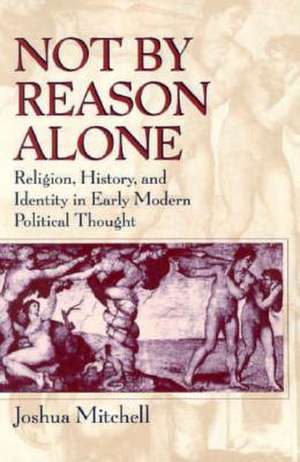Not by Reason Alone: Religion, History, and Identity in Early Modern Political Thought
Autor Joshua Mitchellen Limba Engleză Paperback – 9 oct 1996
Masterfully interweaving political, religious, and historical themes, Not by Reason Alone creates a new interpretation of early modern political thought. Where most accounts assume that modern thought followed a decisive break with Christianity, Joshua Mitchell reveals that the line between the age of faith and that of reason is not quite so clear. Instead, he shows that the ideas of Luther, Hobbes, Locke, and Rousseau draw on history, rather than reason alone, for a sense of political authority.
This erudite and ambitious work crosses disciplinary boundaries to expose unsuspected connections between political theory, religion, and history. In doing so, it offers a view of modern political thought undistorted by conventional distinctions between the ancient and the modern, and between the religious and the political.
"Original. . . . A delight to read a political philosopher who takes the theologies of Hobbes and Locke seriously." —J. M. Porter, Canadian Journal of History
"Mitchell's argument both illuminates and fascinates. . . . An arresting, even stunning, contribution to our study of modern political thought."—William R. Stevenson, Jr., Christian Scholar's Review
This erudite and ambitious work crosses disciplinary boundaries to expose unsuspected connections between political theory, religion, and history. In doing so, it offers a view of modern political thought undistorted by conventional distinctions between the ancient and the modern, and between the religious and the political.
"Original. . . . A delight to read a political philosopher who takes the theologies of Hobbes and Locke seriously." —J. M. Porter, Canadian Journal of History
"Mitchell's argument both illuminates and fascinates. . . . An arresting, even stunning, contribution to our study of modern political thought."—William R. Stevenson, Jr., Christian Scholar's Review
Preț: 292.83 lei
Nou
Puncte Express: 439
Preț estimativ în valută:
56.04€ • 57.90$ • 46.61£
56.04€ • 57.90$ • 46.61£
Carte tipărită la comandă
Livrare economică 19 martie-02 aprilie
Preluare comenzi: 021 569.72.76
Specificații
ISBN-13: 9780226532226
ISBN-10: 0226532224
Pagini: 259
Dimensiuni: 152 x 229 x 20 mm
Greutate: 0.47 kg
Ediția:1
Editura: University of Chicago Press
Colecția University of Chicago Press
ISBN-10: 0226532224
Pagini: 259
Dimensiuni: 152 x 229 x 20 mm
Greutate: 0.47 kg
Ediția:1
Editura: University of Chicago Press
Colecția University of Chicago Press
Cuprins
Preface
Introduction
1: Luther: The Dialectic of Supersession and the Politics of Righteousness
2: Hobbes: The Dialectic of Renewal and the Politics of Pride
3: Locke: The Dialectic of Clarification and the Politics of Reason
4: Rousseau: The History of Diremption and the Politics of Errancy
Conclusion
Notes
Bibliography
Index
Introduction
1: Luther: The Dialectic of Supersession and the Politics of Righteousness
2: Hobbes: The Dialectic of Renewal and the Politics of Pride
3: Locke: The Dialectic of Clarification and the Politics of Reason
4: Rousseau: The History of Diremption and the Politics of Errancy
Conclusion
Notes
Bibliography
Index
